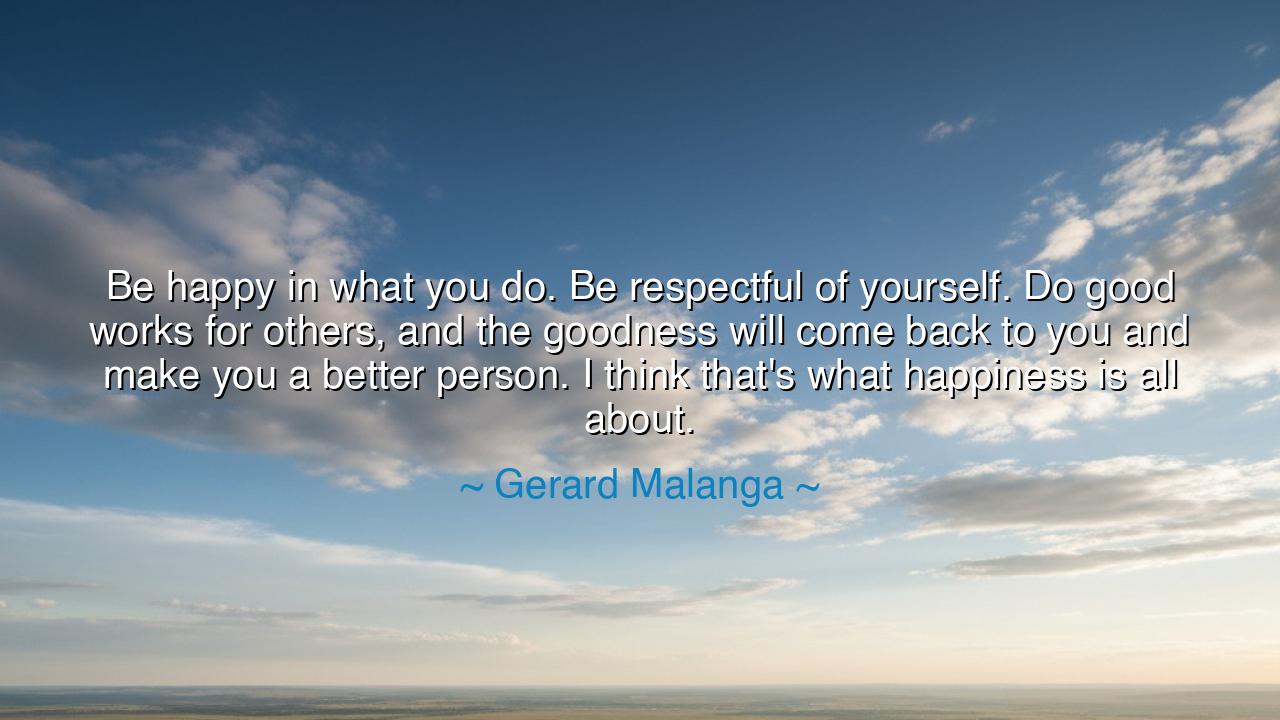
Be happy in what you do. Be respectful of yourself. Do good works
Be happy in what you do. Be respectful of yourself. Do good works for others, and the goodness will come back to you and make you a better person. I think that's what happiness is all about.






The poet and artist Gerard Malanga, whose life has danced between the worlds of art and spirit, once spoke with simple yet profound truth: “Be happy in what you do. Be respectful of yourself. Do good works for others, and the goodness will come back to you and make you a better person. I think that’s what happiness is all about.” These words, humble and luminous, express a wisdom older than time — the eternal law that happiness is not taken, but created; not demanded, but earned through goodness. In them, Malanga offers a teaching as gentle as morning light, yet as firm as the moral pillars of civilization itself.
The origin of this quote reflects the life of a man who lived among the great creative spirits of the 20th century — a collaborator of Andy Warhol, a poet of deep introspection, a man who found art not only in words and images but in living itself. Surrounded by fame, ambition, and the restless pursuit of recognition, Malanga came to see that true contentment is not born of achievement, but of alignment — alignment between one’s inner being and one’s outer deeds. To be happy in what you do, as he says, is to labor with love, to find meaning in one’s purpose rather than in comparison or acclaim. His words remind us that happiness is not a reward from the world, but a reflection of the harmony within the soul.
When Malanga urges us to be respectful of yourself, he speaks against the self-neglect that poisons so many lives. For respect of oneself is not vanity; it is reverence. It is to honor the divine spark that dwells within you — to nourish your mind, your body, your dignity, and your peace. The ancients knew this truth well: the temple of the soul must be kept pure if the spirit is to flourish. To respect oneself is to recognize one’s worth, not in pride, but in purpose. The one who walks in self-respect walks in strength, for they need neither the applause nor the approval of others to feel complete.
Then comes the commandment of goodness: “Do good works for others.” This is the golden key that unlocks the cycle of joy. Happiness cannot be hoarded; it thrives only when shared. The one who gives light to others is themselves illuminated. Across the ages, this truth has been echoed by sages and saints — from the Buddha’s compassion to the Christian call to charity, from the Stoic belief in virtue to the Native wisdom that all good returns in time. Malanga’s insight reflects that same eternal current: goodness is a seed, and when it is planted in another’s heart, it blossoms in one’s own.
Consider the life of Florence Nightingale, who in the grim hospitals of war worked tirelessly for the suffering and the forgotten. She did not seek happiness, yet it found her through her service. Her acts of kindness did not merely heal others — they transformed her into a symbol of mercy itself. In this, she embodies Malanga’s truth: that goodness returns to the giver, reshaping them into something finer, purer, and more complete. The joy of the selfless act is the most enduring form of happiness, for it comes not from possession, but from participation in the divine rhythm of giving and receiving.
Malanga’s reflection also teaches us that happiness is not a goal but a way of being. It is not something to be pursued like a distant prize, but something to be cultivated daily through integrity, gratitude, and compassion. When we are content in our labor, kind to ourselves, and generous to others, we enter into harmony with life itself. The ancients would call this eudaimonia — the blessed state of living in accordance with one’s true nature. It is happiness not as fleeting pleasure, but as enduring peace.
Therefore, let this wisdom be a torch for those who seek meaning: find joy in your work, for it is your song to the world. Respect yourself, for without that foundation, no structure of success will stand. And above all, do good for others, not for reward, but for the beauty of the act itself. For every kindness returns, and every act of love ripples outward, transforming both giver and receiver.
So remember, as Gerard Malanga reminds us: happiness is a circle of giving and gratitude. The more goodness you release into the world, the more goodness you will find returning to your heart. Live your days with purpose, treat yourself and others with reverence, and let each moment of service be your prayer. In this way, you will not merely find happiness — you will become it, and your life will shine like a lamp in the long corridors of time.






AAdministratorAdministrator
Welcome, honored guests. Please leave a comment, we will respond soon